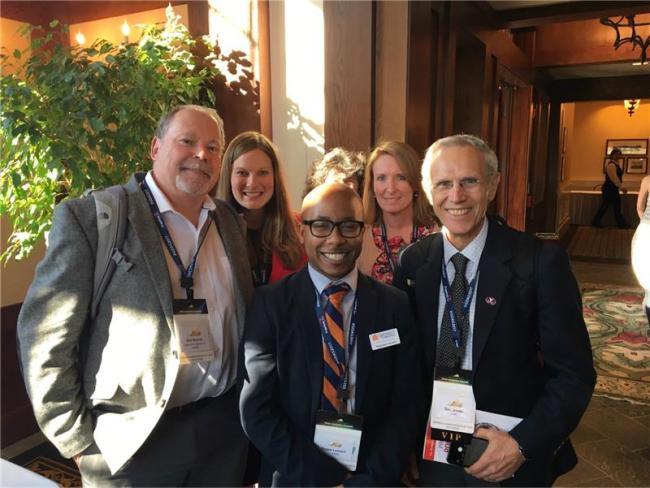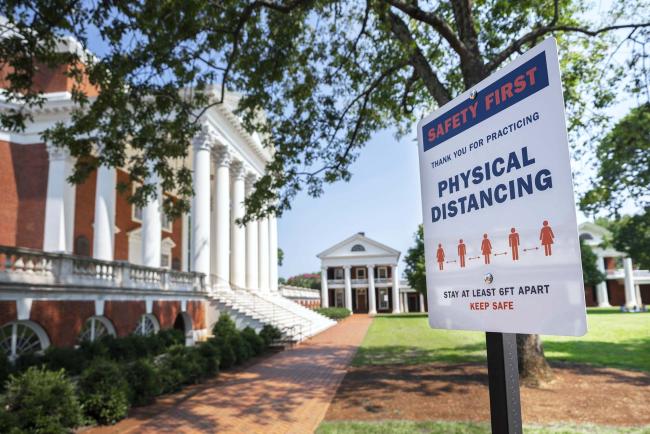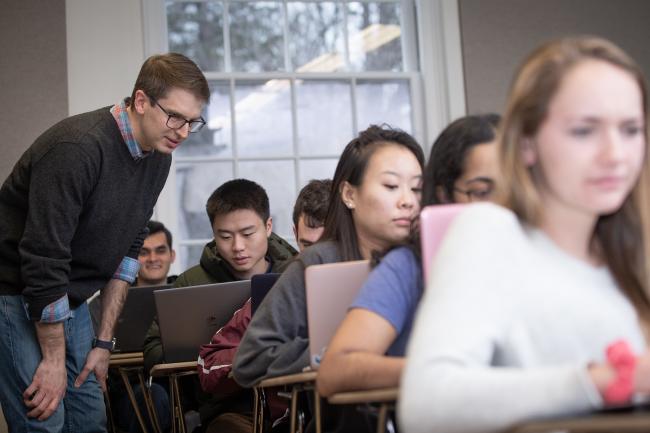Student life
While the master’s program continued to attract a considerable number of applicants, it required students to study in residence at UVA.
This was certainly an appealing aspect to many, but for others, this simply wasn’t feasible for any number of reasons. Some were not in a position to move to Charlottesville. Others couldn’t leave their jobs for a year.
Cathy Anderson had collaborated with Don Brown and Arlyn Burgess during the early days of the Data Science Institute to deliver custom executive education programs while she was at UVA’s School of Continuing and Professional Studies.
A couple of years later, in January 2017, Anderson joined the Data Science Institute team as the Director of Executive and Continuing Education, with the mission of expanding the Institute’s offerings to new audiences.
“Don had been interested in venturing into the online space for a while,” Anderson said. “And that’s, of course, most of what the School of Continuing and Professional Studies did, so I looked forward to applying my experience at the Institute.”
Anderson was excited for the opportunity to expand data science education to new markets of students, and soon, attention turned to the idea of creating an entirely online master’s program.
The Data Science Institute, though, was still a lean operation, and establishing an online degree program would require extensive work, including marketing and student recruitment.
Anderson and others realized they would need an outside vendor to turn their vision into a reality and enlisted Noodle Partners, a firm that specializes in assisting universities with these very needs.
Beyond promoting the program, the institute, which did not have its own faculty, had to earn buy-in from other departments, many of whom, Anderson noted, were “very stretched” in terms of resources.
“There was a lot of going around and meeting with people, talking about what we were hoping to do, and listening to their concerns” she said.
With the provost’s office fully supportive, the online data science master’s degree was announced in fall 2018, with the program launching the following summer, one of the first of its kind at UVA.
Given the unique challenges that students in the online program would face, courses had to be designed to accommodate the needs of students and the extraordinary time demands that many faced.
“They need to really know what to expect for planning purposes because many juggle full-time jobs and families,” Anderson said when it came to assignments, tests, and due dates. She also noted that faculty members would record lessons and other content, which allowed students to view them when their schedules permitted.
While this required many instructors to adjust their teaching styles, the payoff was considerable, as data science education at UVA would now be accessible to a much wider pool of talented and passionate students, many of whom would no longer have to take a year off from work or uproot their families to pursue their goals.
“She never gave up,” Brown said of Anderson. “And sure enough, we got the program.”
“Everyone felt really good about this new student population and being able to serve them,” said Anderson. “They’re just so thankful that they have the opportunity.”
That’s true, Bourne added, “but there were moments when we were stretched so thin. I feared we would not be able to deliver classes.”
Indeed, while the expansion of programs and the ambition of the work of the Data Science Institute — and later the School of Data Science —brought success, it did not come without a cost. Resource limitations amid increasing responsibilities would continue to loom large and weigh on the team as the years went on and ambitions expanded.
In March 2020, the COVID-19 pandemic upended all facets of society, and its impact was felt deeply at colleges and universities across the country.
On March 11, all UVA classes moved online, with students encouraged to return home and President Jim Ryan informing the University community that “we will not be holding classes on Grounds for the foreseeable future.”
Like the rest of the world, the School of Data Science, which was not even six months old when the shutdown began, would suddenly be forced to make dramatic adjustments.
“Phil often said during that time, ‘Building a new school is hard; building a different kind of school is harder; building a different kind of school in the middle of a pandemic is damn near impossible,'” recalled Arlyn Burgess.
Burgess added, though, that the School, despite its youth, was well positioned to weather this unprecedented disruption.
“We had a huge number of resources at our disposal, and also, data science became so important so fast in the pandemic itself,” she said, citing interest in network models and predictive analytics to track the spread of the disease.
Additionally, the School’s recent creation of an online master’s program proved even more beneficial than could have been imagined when it was conceived.
“All the residential students went into that online program,” said Phil Bourne. “So the teaching part was affected, but not as affected as badly as it could have been.”
Still, for a school that was in its infancy, particularly one whose aim was to foster collaboration, the pandemic created unavoidable challenges.
“It’s very much dependent on how people are personally interacting all day, every day,” said Bourne of the conditions needed to create the culture the School was aiming for. “And when you lose that, and everybody’s just in a Zoom window, it really affects things. When I look back on it, I’m actually surprised we did as well as we did.”
For students like Melissa Phillips, it was not the conclusion to her one-year master’s degree experience that she imagined or desired.
“It was challenging and not the way we wanted to end things because we really wanted to have that graduation moment,” she said.
Nevertheless, she credited the School for how it handled an incredibly difficult period.
“I feel like the transition was easier because of all the support we got from faculty and staff,” Phillips said.
Even though it was far from a traditional commencement, Burgess did fondly recall the poignant video remarks Bourne recorded on the steps of the Rotunda to honor the first group of master’s students to graduate since the School of Data Science had been established the year before.
Burgess remembered the moving scene and the look in Bourne’s eyes during his remarks and what she knew it signified: “The people that are getting those degrees are the future of what data science is going to be.”
As the School grew, so too would its academic programs. The School of Data Science would achieve another milestone in this area in 2022 with the approval of a doctoral program.
In a release announcing the new program, Ian Baucom, the University’s provost, underscored what this development meant for the field itself: “Creating a Ph.D. in data science at UVA is another step toward using data to solve global problems.”
The full-time, residential program kicked off in August. Thomas Stewart, an associate professor who would join the faculty that fall, would eventually take the helm as program director.
In a video promoting the new Ph.D., Jeffrey Blume, associate dean of academic affairs, described what would distinguish UVA’s degree from others affiliated with data science but focused on statistics or computer science or some other related discipline.
“What makes our program unique is that we’re all in on data science,” Blume said. “We view ourselves as growing the next generation of data scientists.
In a year-end blog post, Phil Bourne reflected on this momentous moment.
“Our new Ph.D. in data science launched this academic year with 16 diverse students, all risk takers who have entrusted us with their careers,” he wrote. “We will not let them down.”
With the doctoral program approved, residential and online master’s degree offerings, and a very popular minor — which began in 2020 — all established, the School of Data Science lacked only one critical degree option to complete a full suite of academic programs: an undergraduate major.
In 2023 that moment would come. The State Council of Higher Education for Virginia in September approved a data science major. Current first-year students in the 2023-24 academic year would be eligible to apply that spring to join the program’s first cohort in fall 2024.
Describing the new major, Brian Wright, an associate professor of data science and director of the School’s undergraduate programs, said: “We’ve designed and are going to deploy a curriculum that is not seen anywhere else in the country.”
As for interest in the new major among students, there was little concern about that. The data science minor had become the most popular minor at the University, with more than 740 students enrolled from more than 50 majors by 2024, and the enrollment number continues to climb.
“It will be a popular major based on the demand that you’ve seen already from students,” said University President Jim Ryan.
Ryan also noted that the new undergraduate program would help further the University’s mission of serving Virginia and society.
“My hope is that not only will it enable students to be prepared to pursue a host of careers that we didn’t even imagine a decade ago, but also that we will prepare them to make a genuine contribution,” he said.


